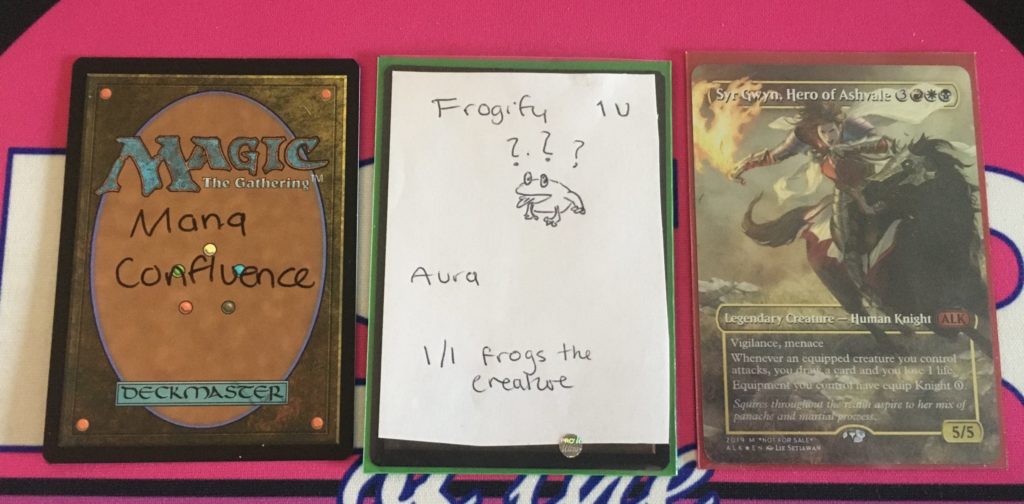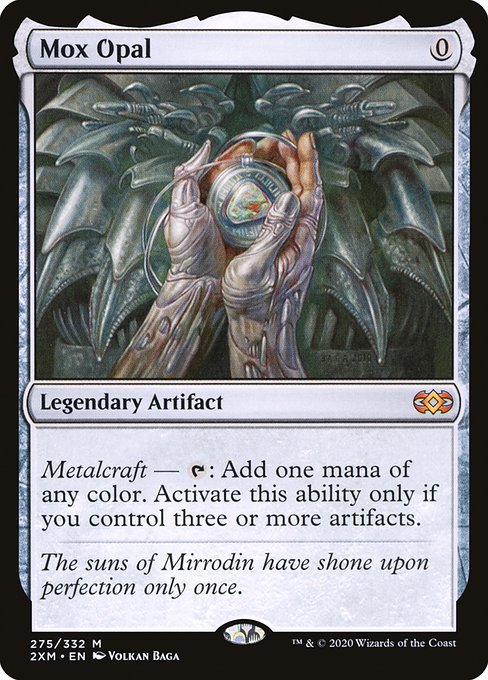When it comes to the headline issues for Magic players, it seems as though everyone has an opinion on proxy cards. Is it okay to play with proxy cards? Who does it affect? Is it morally justifiable? Those are just a few of the questions you might have asked yourself, and regardless of your conclusion, the issue is probably more complex than you’d think. Most people fall into two mains camps, and I’ve found, at least in my experience, that those on either side are both quite vocal, but also quite bias and set in their ways.
Today, I’d like to look at the issue objectively, and explore the issue of Proxy cards in depth. But first, what are Proxies?
Proxy Cards
Proxies are essentially stand-ins for other cards. The dictionary defines Proxy as:
- the authority to represent someone else, especially in voting
- a figure that can be used to represent the value of something in a calculation
In Magic terms, this is essentially using one card to represent another. The most common way this is achieved is by inserting a piece of paper over a reversed Magic card, with basic and often crudely rendered information indicating what the card is. This could be as sparse as solely the card name, but as detailed as to include the rules text and a fun doodle. Others will opt to write in marker on the back of a bulk card in order to circumvent the need for paper at all, while others still will spend hours on graphic design to represent the card in the most accurate or aesthetically pleasing way possible.

A series of proxies. The Syr Gwyn proxy is made by a not-for-profit community member, ALK Alters, who does giveaways regularly
The most important distinction to make here is that proxy cards, no matter how realistic, are not legal in tournament magic. This means that in any official tournament, whether a Mythic Championship or just FNM at you local store, the cards are illegal to play with. So, why use Proxies?
Why Proxy?
The most common way to use a Proxy card is for playtesting. Whether this is for a 60-card constructed format like Modern, Pioneer, or Standard, or for testing out the Limited environment in a way that is cost efficient to competitive players; playtesting forms the biggest population of proxy users when it comes to Magic: the Gathering. The attraction of proxies becomes clear when looked at from this angle—Magic cards can be expensive, and so it helps to be sure that it’s worth parting with your hard earned cash before picking up a playset for your deck.
For formats like Limited, many of the top teams will want to practice as soon as they physically can in order to gain a competitive edge over other competitors. The moment spoiler season finishes, printers will fire up and print proxied versions of the spoiled cards, to immediately be drafted and playtested before the product is available to buy. In many ways, proxying cards this way seems like a necessity—it’s essential to be well versed in a format, and experienced with new cards, as soon as possible. What’s more, if the pros are doing it it must be fair, right?
But what about formats like Commander? Why should you proxy there?
Proxying in Commander
Proxying for formats like Commander is what has given rise to the debate about proxies, more than any other format. At its core, Commander is a casual format—as many like to say, “it’s not about the winning, it’s about doing cool stuff.” Yet, people still proxy cards in Commander.
For some, they like to practice with newly spoiled cards to test out interactions with cards they own. In a lot of ways, this is no different to a pro team practicing with new cards—it’s harmless, generally speaking, and comes from a place of seeking to understand and learn, more than anything else.
A pretty intuitive way to use Proxies is to denote cards you own in your collection, but that are required in multiple singleton decks. As you don’t technically need six copies of Solemn Simulacrum, you can save time resleeving between decks by having a proxied card in each of your EDH decks, and a “side deck” with the real cards in. Most players shouldn’t have an issue with you shortcutting like this, and it can save you a lot of time, and importantly, money.
Others still like to use Proxy cards in a similar vein to altered cards, using the opportunity to enact their own personal artistic direction to achieve their own personal aesthetic. Proxies in this way often replace cards that can’t be foiled, for example—adding a foil proxy to a deck that has otherwise been foiled out as a passion project.
The aesthetic decision to proxy might also come into play when trying to achieve a certain theme or style for a deck. Having the artwork of a card reflect the Commander, or a tribe in the deck, can go a long way to making a deck feel complete. Card alterists—artists that paint in thin layers over an official Magic card to alter the appearance—have been doing this for practically as long as Magic has been around, in a similar manner. An altered Magic card is still legal if the original text denoting the name of the card is unobscured, and the paint isn’t too thick to alter the thickness in shuffling—though this is ultimately to a judge’s discretion, and they can refuse altered cards entirely.
Proxying in Commander isn’t limited to aesthetics and playtesting the odd new card, however. There are many players that want to proxy cards that they simply can’t afford. The common argument is that when cards are costing hundreds or even thousands of dollars, the fault is with Wizards and the reserve list, or the over inflation of card prices on the secondary market. Because of this, they argue, they should be free to simply proxy these expensive cards, and enjoy the play experience that many others who were either luckier or better off are able to.
I don’t necessarily disagree that Magic cards being expensive is a problem, and I also lament the fact that I can’t afford to add certain cards to my collection because of this. Some players have decided to use the gold-bordered World Championship series cards as a way to solve this. What started out as a cheap way to get access to cards like Enlightened Tutor and Gaea’s Cradle has now ended up with these ‘proxy’ cards fetching nearly $100 for the pricier options – and that’s a lot of money to invest if the table you sit down at doesn’t condone this solution. The issue doesn’t really end there, though, and much to the chagrin of many players who feel like it does, I want to explore it a little deeper.
The Casual vs Competitive Problem

When considering high-end Commander, whether competitive in nature, or in name (like cEDH), I think this argument is most watertight. When playing competitively, it is beneficial to players to have access to the same cards, and when looking at competitive Commander, it’s more akin to Vintage than it is to Modern. The staples of both cEDH and Canlander can be very expensive, with the latter even having Black Lotus available for play. Proxies are a potential solution to this, to allow more people to play cEDH and Canlander, and I can definitely get behind this.
On the other hand, I don’t think argument is as relevant when you consider that Commander, at it’s heart, is a casual and social format. At any other level of play, there isn’t a need to play with rare and expensive cards—indeed, the format began as a way to play the cheaper and jankier cards that don’t see play anywhere else. Power creep has unfortunately started to push that idea out of vogue, with the speed and consistency of most decks increasing rapidly over the past year or two, thanks to insanely pushed cards. When power creep pushes more casual players to react, sometimes that reaction will lead to considering older and more powerful cards that they don’t own.
At risk of going way off topic, a great way to frame this is in relation to fast mana. I won’t get into the pros and cons of it here (or what my ultimate thoughts are); but I feel like for some color combinations to compete with the raw value in Green, it’s becoming more and more acceptable for them to be playing cards like Mana Vault, Mana Crypt, and Grim Monolith. Whether you think these cards should be banned or not, the point is that they are expensive, and for many decks, looking backwards provides as many (if not more) solutions than looking forward would.
The Ethics of Proxying

There’s more to consider when thinking about proxies, though. What impact does using a proxy have on you, your playgroup, or your Local Game Store?
First off, consider that by starting to proxy, you’re essentially making the first move in an “arms race.” Now, it’s not that arms races don’t exist outside of proxying; but more that, beyond playtesting the odd card here and there, when you really start to proxy more frequently, you’re inviting the other players in your group to join you. Even if they might be reluctant, there’s little to say they shouldn’t join you if they want to keep up. If you’re proxying a better mana base, then why shouldn’t they? The arms race can in this instance run to its logical conclusion—before you know it, you could be proxying most of a deck. There’s no financial barrier to stop this from happening, and it’s a lot harder to try and manage.
I’ve talked to players who do this—players who turn up at a shop expecting to play these cobbled together piles of competitive scrawlings because, “it’s all they have to play with their other playgroup.” Whether the shop would allow this or not aside, it’s not conducive to playing outside your own playgroup, and it isn’t in the spirit of Commander. Not many playgroups would allow this. That’s a great segue to talk about Local Game Stores, though, so let’s move on.
We all know that the LGS is struggling. With each new product Wizards sells direct, and each discount on buying online, the incentive to purchase from an LGS dissipates. It’s not the only front they have to fight on, though, with increasing tax and rent prices depending on where in the world you are. All in all, it’s a miracle some are still open, and too many of us have had to watch our favorite places to play shut down.
Knowing all of this, I think it can be pretty ignorant to then take proxy cards into a shop that relies on selling singles for a living. Even if it’s “only one card,” or you don’t do it all of the time, or it’s not a sanctioned event, or whatever reason you’d offer up as an excuse. Ultimately, it can propagate the idea that proxies are okay, and when that idea spreads through playgroups; and gradually the store, it can lead to a downturn in singles sales from the shop. I’m not going to sit here and deny that most people buy pricier singles online, because they do. What I’m talking about, more generally, is the cheaper cards. The cards costing less than $5. These are the impulse purchases that keep an LGS alive, and these are the cards that proxies hurt the most.
Many stores don’t allow proxies for this reason, and I respect that. Moreover, when you consider that for any event to fire and be logged by stores it has to be a legal event, it begs the questions of why Commander should be exempt from the same rules that govern every other sanctioned format.
As an aside, proxies from a gameplay perspective can also be pretty jarring. It’s a fun challenge to get someone to recall the modes on a Player Reward’s Cryptic Command, but when facing down multiple minimal-effort proxies across a table, it can become frustrating quickly if those proxies aren’t providing an accurate level of detail to represent the card they are meant to be representing. Misplays can happen, and when it’s due to game-pieces being sub optimal, it’s no fun.
What’s the Answer?

To really find an answer to the issue, it’s necessary to think about what’s important to you and your playgroup. At home, on the kitchen table, anything goes. Out there in the wild, though, I think it’s important to consider the wider consequences of how you represent the hobby to other players. Proxying is a way to make magic more accessible to everyone, and that’s a great goal; I think, though, that this can be achieved in a way with less feel bad, and less impact on the stores that might miss out on single sales.
It’s pretty simple—even if we’d love to play with Gaea’s Cradle, we should be happy to play at a lower power level and forgo the proxy depending on the context. Ultimately, those around us should respect that decision, and playgroups should be happy to make Commander the most inclusive that it could be by adapting to others and ensuring nobody feels left behind. It’s easy to take a position that you’ve worked hard to earn those high-end cards, and that everyone else should have to, too. It doesn’t end there, though, and if you want to take that position, it’s probably better to meet other players half-way and build a more casual deck, too. We’re all happy to donate cards to newer players to catch them up a little, but de-powering some of your decks is also a great option.
There’s always going to be a card out of reach, and really, Magic is a privilege that we should enjoy responsibly. As much as I can sit and advocate for proxying being bad for the ecosystem, I can’t not acknowledge that the pieces of cardboard in many deckboxes are worth more than their weight in gold. At the end of the day, however you feel about proxies, we could always do with more reprints. Some archetypes even hinge on these types of cards being available at a reasonable price—I’ve attempted to build lands-matters decks like The Gitrog Monster countless times, and each time I’ve felt underwhelmed precisely due to my lack of fetchlands. Wizards seem happy enough to print these Commanders, like Lord Windgrace, but not reprint the cards that are most needed to support them.
It’s an awkward place to be, and I hope things change soon. Mystery Booster and Commander Legends are both looking to shake up the Commander scene with reprints this year, but I just hope it’s enough.
What do you think? Do you allow gold-bordered cards at your table? What about full proxies of cards that people don’t own? Let me know on Twitter what you think to continue the discussion.
Based in the UK, Kristen is a lover of both Limited and Commander, and can most often be found championing the Boros Legion when called upon to sit down and shuffle up.

